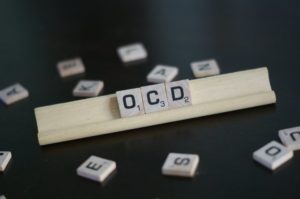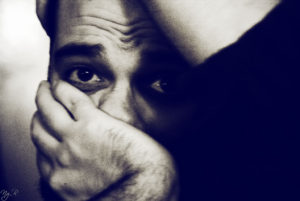OCD, or Obsessive Compulsive Behavior, is a recognized mental health disorder, according to the Diagnostic and Statistical Manual of Mental Disorders, Fifth edition. The condition produces both unwanted and recurring ideas, sensations, or thoughts.
 Often, these unwanted and recurring intrusions drive the person to a repeated behavior, known as a compulsion. These behaviors regularly appear as excessive, for example, a need to wash your hands repeatedly or cleaning non-stop. Such patterns are a common type of OCD behavior. If left unchecked, these compulsive behaviors will eventually interfere with daily life and negatively impact the person’s life.
Often, these unwanted and recurring intrusions drive the person to a repeated behavior, known as a compulsion. These behaviors regularly appear as excessive, for example, a need to wash your hands repeatedly or cleaning non-stop. Such patterns are a common type of OCD behavior. If left unchecked, these compulsive behaviors will eventually interfere with daily life and negatively impact the person’s life.
To be clear, not all repeated and regimented behavior is OCD. In fact, some of that behavior is just discipline and will actually improve someone’s life. This sort of behavior is not OCD. A key characteristic of OCD behavior is its root in persistence and unwanted intrusions. Santa Monica Christian Counseling provides support for understanding and managing OCD effectively.
If the compulsive behavior is not the result of discipline and self-improvement, but rather to ease obsessive thoughts, then it will result in great stress. Sometimes those struggling with OCD even have the awareness to realize their behavior has no real impact on the obsessive thoughts, but trying to stop the behavior increases their stress further.
“Do I Have OCD?”: Diagnosing Obsessive Compulsive Disorder
Two key criteria are needed to properly diagnose OCD: obsessions, compulsions, or both.
According to the DSM-5, obsessions are:
- Persistent and recurrent urges, images, or thoughts, experienced during the disturbance as unwanted and intrusive, and that in most individuals result in marked distress or anxiety.
- The individual attempts to suppress or ignore these urges, images, or thoughts, or to alleviate the anxiety caused by them with some other action or thought (i.e., by performing a compulsion).
According to the DSM-5, compulsions are:
- Repetitive behaviors (e.g., hand washing, ordering, check- ing) or mental acts (e.g., praying, counting, repeating words silently) that the individual feels driven to perform in response to an obsession or according to rules that must be applied rigidly.
- The behaviors or mental acts are aimed at preventing or reducing anxiety or distress, or preventing some dreaded event or situation; however, these behaviors or mental acts are not connected in a realistic way with what they are designed to neutralize or prevent, or are clearly excessive.
It is also necessary to evaluate the amount of time obsessions or compulsions take up. To be diagnosed with OCD, they must take up at least one hour a day to warrant clinically significant distress or impairment. Most commonly people should look to see if the behaviors are affecting them negatively socially, occupationally, or in other significant parts of your life.
 When evaluating your life for OCD, you need to take other factors into account. For example, OCD is not the proper explanation for those abusing alcohol, drugs, or other medications. Also, it is important to consider other medical conditions that could mimic OCD behavior.
When evaluating your life for OCD, you need to take other factors into account. For example, OCD is not the proper explanation for those abusing alcohol, drugs, or other medications. Also, it is important to consider other medical conditions that could mimic OCD behavior.
Sometimes there are other health disorders that better explain the symptoms. For example, a preoccupation with appearance could be a symptom of OCD, but can also be related to a body dysmorphic disorder. It will be important to seek a mental health professional to provide a diagnosis because they can help you diagnose what your actual disorder is.
Examples of Obsessive Compulsive Behavior:
- Cleaning and washing repeatedly
- Counting
- Tapping
- Excessive double-checking of things. These could be locks, appliances, and switches.
- Constantly checking in with somebody to make sure they are safe.
- Arranging or ordering things continuously so they are “perfect”
Examples of Obsessive Thoughts:
- Fear of contamination (germs)
- Fear of harming others or yourself
- Intrusive violent or sexual thoughts or images
- Superstitions such as giving an inordinate amount of attention to something you consider “lucky” or “unlucky”
Treatment for Obsessive Compulsive Disorder
OCD Therapy
One option for treatment is therapy. In fact, I believe it is necessary to address the root obsessions. Therapy is not one size fits all and there are several treatments you can try with a therapist to treat OCD.
The most common type of therapy to treat OCD is exposure and response prevention, or ERP. Exposure and response prevention is a type of cognitive behavioral therapy (CBT). The method focuses on having patients expose themselves to triggering images, situations, and objects, usually whatever brings up their anxiety and obsessive thoughts.
Then, they are trained and coached in response prevention, choosing not to practice the compulsive behavior. At first, this experience is practiced under the supervision of a therapist, but over time the individual will learn to respond on their own.
It can be frightening to think about intentionally engaging something that triggers an obsession. It feels like the last thing you want to do. But, by approaching the obsession directly, the patient is able to learn to make an active choice to overcome the anxious thoughts and compulsive behavior, which previously controlled them. Over time, they will grow in confidence and control over their obsessions, granting them greater overall freedom in life.
OCD Medication
Another option is to talk to a Psychiatrist. It may not be necessary, but if you think medication would help then you may want to schedule an appointment. From there, you will be able to talk with an expert about the benefits and drawbacks of medication. It can be a helpful tool to have in your toolbox.
 Some medications, like SSRIs, are helpful for some people suffering from an Obsessive Compulsive Disorder. Typically, they will require a higher dosage, but remain very safe and have few side effects.
Some medications, like SSRIs, are helpful for some people suffering from an Obsessive Compulsive Disorder. Typically, they will require a higher dosage, but remain very safe and have few side effects.
Ways to Help Yourself
Meeting with a professional is a great place to start, but you need to be prepared to put in the work of implementing what you learn into your life. Sessions with a professional are not enough for you to change, you need to practice what you learn.
Even before meeting with a professional, there are ways to move forward to improve your wellbeing and recovery from OCD. Finding ways for you to relax personally is going to be key, as well as finding other healthy outlets to distract yourself from your struggle with OCD and its associated discouragement. Here are some ideas to get you started.
Yoga Meditation
Yoga and meditation are great ways to relax. Going through recovery can be exhausting, so it is important to find life-giving activities to help you relax. Facing the compulsions often produces great anxiety, especially during intentional therapy, so having a way to quiet your mind and escape is a valuable tool.
Mindfulness
Another helpful tool to keep you calm is mindfulness. Mindfulness techniques can be learned in therapy or through your own personal research. Ask your therapist to teach you a few mindfulness techniques or get a book to help you learn some at home.
Exercise
Exercise is a fantastic way to reduce stress and frustration. It’s also helpful because it releases endorphins, which produce a positive feeling in your body. Remember you don’t have to be going to the gym five days a week to feel better. It’s as simple as taking a brisk walk for thirty minutes.
Be your own best advocate & cheerleader
 It’s key to not be dependent on validation from other people. This is easier said than done. It can be helpful to talk to yourself gently and acknowledge the progress you are making, no matter how small. Nobody can do the work for you and you are the person who will feel the effects of your work. So don’t forget to celebrate your progress personally.
It’s key to not be dependent on validation from other people. This is easier said than done. It can be helpful to talk to yourself gently and acknowledge the progress you are making, no matter how small. Nobody can do the work for you and you are the person who will feel the effects of your work. So don’t forget to celebrate your progress personally.
Do not wait for perfection before you are grateful
I once heard my pastor say to not wait for perfection before you are grateful. This definitely applies here. If you wait to be better before you are thankful, then this is going to be a long, hard road. You may not be where you want to be, but it’s important to celebrate where you are and keep moving forward.
Talk to God and be in His Word
Trusting in God is necessary. God promises hope and comfort. Let’s consider what the Bible says about this. A favorite passage of mine is Psalm 23 which is particularly relevant for those struggling with anxiety.
The Lord is my shepherd, I lack nothing. He makes me lie down in green pastures, he leads me beside quiet waters, he refreshes my soul. He guides me along the right paths for his name’s sake. Even though I walk through the darkest valley, I will fear no evil, for you are with me your rod and your staff, they comfort me. You prepare a table before me in the presence of my enemies. You anoint my head with oil; my cup overflows. Surely your goodness and love will follow me all the days of my life, and I will dwell in the house of the Lord forever. – Psalm 23
The promise in these words is profound. It says that the Lord, our good shepherd, will provide water, food, work, love, safety, anything we need. He will guide us and remain with us even if we lose our way. When the psalmist says, “I lack nothing,” he is recognizing that God gives us everything we need. The depths of this psalm could be mined for pages, but what is clear is God promises to take care of our needs. He will protect and guide us, and we need not be overwhelmed by anxiety and fear.
Trust in the Lord with all your heart; do not depend on your own understanding. Seek his will in all you do, and he will show you which path to take. – Proverbs 3:5-6
Again, this is a tremendous promise of God. He promises to show us which path to take. If we truly let go of our own sense of control and self-reliance, staying out of our own heads, including surrendering our obsessions, then God can and will guide us through life.
Other Scriptures with the promise of God’s care:
So humble yourselves under the mighty power of God, and at the right time he will lift you up in honor. Give all your worries and cares to God, for he cares about you. – 1 Peter 5:6-7
I am leaving you with a gift—peace of mind and heart. And the peace I give is a gift the world cannot give. So don’t be troubled or afraid. – John 14:27
Now may the Lord of peace himself give you his peace at all times and in every situation. The Lord be with you all. – 2 Thessalonians 3:16
Faith Without Deeds is Dead
God promises to always be there for us. In James, it says, “Faith without deeds is dead.” This is a pivotal teaching. Surely we want to be in God’s word and spending time in prayer, but faith without actual deeds is dead.
Someone can pray to relief from their Obsessive Compulsive Disorder, but that doesn’t mean God will magically strike them with spiritual healing like someone is struck by lightning. Rather, as Christians, we are called to put in work, or deeds, too. What this “work” will look like will vary from person to person. But, remaining faithful through our work is an amazing way to heal and stay on the path to recover from OCD, and any other trail in life. Reach out to a counselor at Santa Monica Christian Counseling for guidance and support as you navigate this journey.
In Closing
Obsessive Compulsive Disorder is treatable. Let this fill you with hope for your own struggle or the struggle of the loved one in your life dealing with an Obsessive Compulsive Disorder. Seek out a professional. It will be a difficult road, but God is with you and will support you every step of the journey. Remember, you do not walk this road alone.
“OCD”, Courtesy of Airpix, Flickr.com, CC BY 2.0 License; “Fear”, Courtesy of Noemi Galera, Unsplash.com, CC0 License; “Forest Road”, Courtesy of Bru-nO, Pixabay.com, CC0 License; “Sunbeam Landscape”, Courtesy of Lars Nissen Photoart, Pixabay.com, CC0 License


